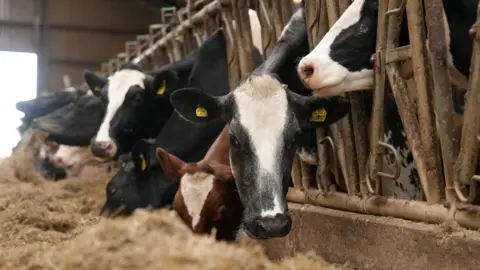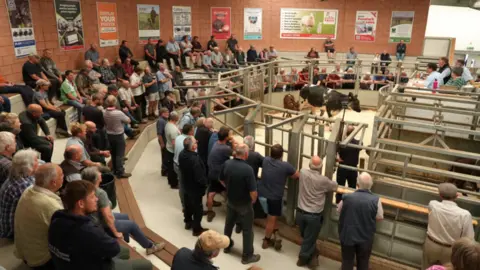Farmers 'not listened to' on deadly livestock virus
 BBC
BBCThe farming sector "wasn't listened to" by the Welsh government over bluetongue restrictions in Wales, according to industry bodies.
Since Tuesday, farmers wanting to move cattle, sheep and goats from England into Wales face new restrictions.
The Welsh government has said it is trying to prevent the virus from entering Wales.
But on Wednesday a Senedd committee heard the policy was "another nail in the coffin".
Spread by midges, bluetongue presents no threat to food safety or human health, but can be fatal for livestock, including sheep and cattle.
Following a UK government decision, the whole of England has been designated as a restricted zone since Tuesday.
That means animals can be moved within England without restriction.
The decision has prompted the Welsh government to impose strict rules on the movement of livestock into Wales from England as it attempts to prevent the virus from crossing the border.
Animals coming into Wales to be slaughtered can still be transported without a pre-movement test.
However, their slaughter must take place within 24 hours and "the movement must take place after dawn and be completed before dusk".
On Wednesday, the British Meat Processors Association Chief Executive Nick Allen told the Senedd's economy committee the policy would "undoubtedly" raise questions about the viability of some meat processing plants in Wales.

"It's going to cause problems and it's going to make your plants in Wales less competitive because it's going to be harder to bring animals into Wales," he said.
Mr Allen told the committee the main meat processing plants brought in a third of their animals from outside Wales on average.
"Frankly, it's another nail in the coffin," he added.
Mr Allen said he had discussed the concerns with the Welsh government "two weeks ago".
Asked what response he was given, Mr Allen said "the industry wasn't listened to".
Animals being transported to be kept alive, for example for breeding, will have to undergo testing or be vaccinated before they can be brought into Wales.
The Association of Independent Meat Suppliers Chairman John Thorley told the committee that ordinarily a lot of stock would be moved around the UK at this time of year.
He also claimed the "artificial boundary" now in place between Wales and England was "creating trading difficulties not only that will create very little benefit, but which will cause huge difficulty".
Explaining the government's policy last week the Cabinet Secretary for Rural Affairs, Huw Irranca-Davies, said: "Our approach now, is to do our darnedest to keep bluetongue out of Wales.
"We're trying to do this to actually buy farmers time as well."
He added: "If bluetongue does spread, and if it spreads more rapidly than we anticipate, we can change very quickly and dynamically."
